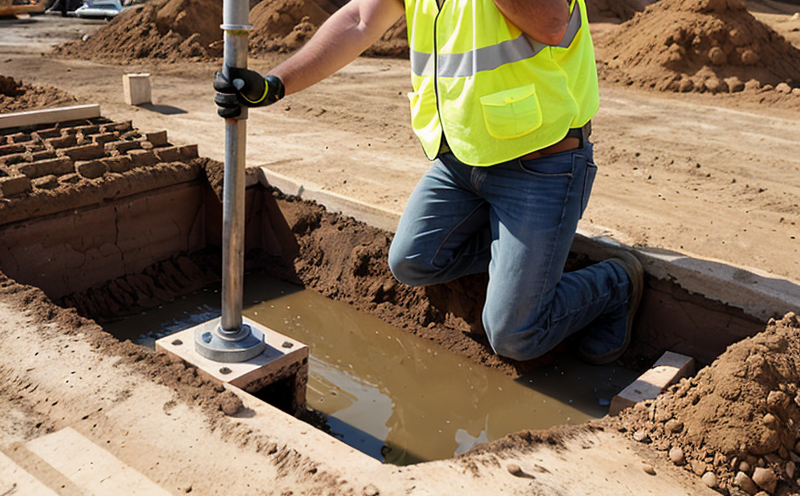ASTM D2573 Vane Shear Test
The ASTM D2573 Vane Shear Test is a fundamental method used to determine the shear strength of cohesive soils. This test is particularly important for geotechnical engineers and construction professionals as it provides critical data that can influence decisions regarding foundation design, excavation stability, slope stability, and overall structural integrity.
The vane shear test involves inserting a small cylindrical probe (vane) into the soil at various depths to measure the frictional resistance. The probe is rotated against the surrounding soil mass until failure occurs, marking the point of maximum shear stress. This method allows for an assessment of both undrained and drained shear strength under varying conditions.
The test setup typically includes a vane shearing device with a specified diameter and length, which is inserted into a borehole created in the field or laboratory setting. The probe has a blade that rotates around its axis to measure the resistance encountered during rotation. This resistance value provides insights into the soil's mechanical properties.
ASTM D2573 specifies precise procedures for conducting vane shear tests, including specimen preparation and instrumentation calibration. It ensures consistency across different testing facilities by establishing standardized practices. The test is widely accepted in the industry due to its simplicity and reliability in evaluating cohesive soils' strength characteristics.
The results from ASTM D2573 are essential inputs for engineers designing foundations, retaining walls, embankments, and other structures that interact directly with soil. Accurate shear strength data helps prevent structural failures and ensures safety during construction processes.
Understanding the limitations of vane shear tests is crucial when interpreting their results. One limitation lies in the fact that this test does not account for all possible failure mechanisms within complex soils. Additionally, it assumes uniform stress distribution around the probe, which may not always be true in real-world scenarios. Despite these constraints, ASTM D2573 remains a valuable tool for assessing cohesive soil properties.
Another application of ASTM D2573 includes its use during site investigation phases where initial estimates of shear strength are needed before more extensive testing can be conducted. By providing an approximate measure of the soil's behavior, this test aids in optimizing resource allocation and planning efficient construction schedules.
In summary, ASTM D2573 plays a vital role in assessing cohesive soils' shear strength by offering reliable data through simple yet effective procedures. Its significance extends beyond just technical accuracy; it also contributes significantly to ensuring structural safety and enhancing project efficiency across various sectors within the building & infrastructure industry.
Why It Matters
The ASTM D2573 Vane Shear Test is crucial because accurate shear strength data informs critical decisions in construction projects. This test provides essential information about cohesive soils' behavior, which directly impacts foundation design, excavation stability, and structural integrity.
- Foundation Design: Reliable shear strength values ensure that foundations are appropriately designed to support structures without compromising safety or stability.
- Excavation Stability: Understanding the soil's shear properties helps predict potential slippage risks during excavation processes, allowing for preventive measures.
- Slope Stabilization: Vane shear tests contribute to assessing landslide susceptibility and determining appropriate mitigation strategies.
- Structural Integrity: By providing accurate shear strength data, the test supports the development of robust structures that can withstand environmental pressures.
In essence, ASTM D2573 is not just a technical procedure but an integral part of ensuring safety and efficiency in construction projects. Its importance cannot be overstated, especially given its wide acceptance within the industry.
Eurolab Advantages
EuroLab offers unparalleled expertise in conducting ASTM D2573 Vane Shear Tests, leveraging advanced equipment and experienced personnel to deliver precise results. Our state-of-the-art facilities ensure consistent quality across all tests performed.
- Accurate Results: EuroLab uses high-precision instruments calibrated according to international standards, ensuring reliable data that meets strict accuracy requirements.
- Comprehensive Reporting: We provide detailed reports accompanied by visual aids such as graphs and images, facilitating easy interpretation of results.
- Expertise: Our team comprises highly qualified professionals with extensive experience in geotechnical testing, ensuring comprehensive understanding and application of ASTM D2573 protocols.
- Timely Delivery: EuroLab prides itself on delivering timely reports, allowing clients to make informed decisions promptly.
Our commitment to excellence makes EuroLab the preferred choice for organizations seeking reliable and accurate geotechnical testing services. With us, you can trust that your projects will benefit from thorough analysis conducted by experts in their field.
Why Choose This Test
- Simplicity: The ASTM D2573 Vane Shear Test is straightforward to perform, making it accessible for use even when more comprehensive testing isn't feasible.
- Rapid Results: Unlike some other geotechnical tests that require extensive time and resources, the vane shear test provides quick results, allowing for quicker decision-making processes.
- Versatility: This method can be applied to various types of cohesive soils, offering flexibility depending on specific project requirements.
- Cost-Effective: While it may not replace more elaborate tests entirely, the vane shear test offers a cost-effective alternative for preliminary assessments or when detailed information isn't necessary immediately.
- Standardization: Conducted according to ASTM D2573 standards ensures that results are comparable across different locations and testing facilities.
- Practicality: The test can be performed in both laboratory settings and the field, providing practical solutions for various project stages.
The combination of simplicity, rapidity, versatility, cost-effectiveness, standardization, and practicality makes ASTM D2573 a valuable tool in geotechnical engineering. Choosing this test allows professionals to gather necessary data efficiently while adhering to industry best practices.





